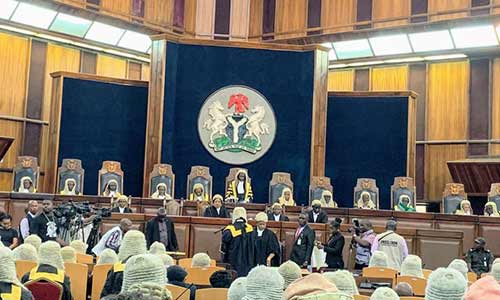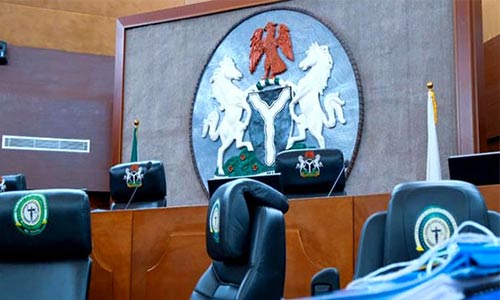SUPREME COURT JUDGEMENTS 08/08/2023
Extent Of Court’s Power In Relation To Chieftaincy Declarations

In the Supreme Court of Nigeria
Holden at Abuja
On Friday, the 31st day of March, 2023
Before Their Lordships
Olukayode Ariwoola
John Inyang Okoro
Amina Adamu Augie
Tijjani Abubakar
Emmanuel Akomaye Agim
Justices, Supreme Court
SC/CV/612/2021
Between
PRINCE FEMI AGUNSOYE APPELLANT
(For himself and on behalf of the Agunsoye
Ruling House of Ijebu-Jesa)
And
- PRINCE JOSEPH BABALOLA AROJOJOYE
(For himself and on behalf of the Nibayo/Laguna
Ruling House of Ijebu-Jesa)
- PRINCE ADEBUSOYE OLAJIDE ADEWUMI
(For himself and on behalf of the Nibayo/Laguna
Ruling House of Ijebu-Jesa)
- PRINCE (PROFESSOR) ABAYOMI ONI
(For himself and on behalf of the Ajigiteri
Ruling House of Ijebu-Jesa)
- PRINCE (AIR VICE MARSHAL) SAMUEL
OLUWARANTI ABOSEDE
(For himself and on behalf of the Amolese
Ruling House of Ijebu-Jesa)
- OSUN STATE GOVERNMENT
- THE ATTORNEY-GENERAL OF OSUN STATE
- MINISTRY OF LOCAL GOVERNMENT AND
CHIEFTAINCY MATTERS, OSUN STATE RESPONDENTS
(Lead Judgement delivered by Honourable Tijjani Abubakar, JSC)
Facts
The 1st to 4th Respondent instituted an action against the Appellant and the 5th to 7th Respondent, seeking inter alia, a declaration that the selection of the Appellant as the Elegboro-elect of Ijebu-Jesa is irregular and a violation of the customs and traditions of Ijebu-Jesa. They sought an order setting aside his selection, and an order directing a fresh process of selection to be made in accordance with the established tradition and customs.
The Appellant filed a notice of preliminary objection, challenging the jurisdiction of the trial court to entertain the suit, and the competence of the 1st – 4th Respondent to institute the suit. After considering the submissions of respective counsel, the trial court dismissed the preliminary objection. Aggrieved, the Appellant appealed to the Court of Appeal which affirmed the ruling of the trial court, and dismissed the Appellant’s appeal. The Appellant thus, filed a further appeal to the Supreme Court.
Issues for Determination
The Supreme Court considered the following issues submitted for determination by the Appellant:
- Whether the 1st to 4th Respondent’s failure to wait for the outcome of their petition to the Governor and Commissioner for Chieftaincy Affairs, does not constitute non-compliance with the conditions precedent stipulated in Sections 20 and 35 of the Chiefs Law of Osun State.
- Whether the 1st – 4th Respondent’s claims before the trial court can be granted in the absence of the Oriade Local Government Authority, the appointing authority to the stool of Elegboro of Ijebu-Jesa.
- Whether the Court of Appeal was not wrong, when it held that the 1st – 4th Respondent disclosed sufficient locus to institute the action.
- Whether on the strength of AJAKAIYE v IDEHA (1994) 8 NWLR (PT 364) 504 on the duty of a court not to usurp executive functions vis-à-vis chieftaincy declarations, the Court of Appeal was not wrong when it held that the trial court had jurisdiction over the 1st to 4th Respondent’s suit.
Arguments
On the 1st issue, counsel for the Appellant argued that the 1st to 4th Respondent did not exhaust the administrative remedy provided by the Chiefs Law, before approaching the Court for judicial intervention. He contended that they ought to have waited for the decision of the Governor and Commissioner for Chieftaincy Affairs on their petition, before instituting the action. He submitted that the Respondents’ failure to satisfy this condition before commencing an action, robbed the court of jurisdiction to entertain the suit.
Responding, counsel for the 1st to 4th Respondent argued that the 1st – 4th Respondent had sufficiently exhausted the administrative remedies laid down by the Chiefs Law, before instituting the action. He contended that they submitted a petition to the Governor complaining about the illegality in the procedure employed in selecting the Appellant, and having petitioned without getting any response, the only remedy available to them was to approach the court to litigate their grievance.
On the 2nd issue, counsel for the Appellant argued that since the case presented by the 1st to 4th Respondent bordered largely on the process leading to the appointment of the Elegboro of Ijebu-Jesha by the Oriade Local Government Authority, the said Oriade Local Government Authority was a necessary party and ought to have been joined. He submitted that, the non-joinder rendered the action incompetent.
Conversely, counsel for the 1st to 4th Respondent argued that the action is not in any way incompetent, because of the mere non-inclusion of the Oriade Local Government Authority, as it was only a desirable party and not a necessary party.
On the 3rd issue, counsel for the Appellant argued that the 1st – 4th Respondent do not have the locus to institute the action, because they were pursuing the same for their personal benefits, rather than for the benefit of the ruling houses whom they were purporting to represent as permissible under the law.
Counsel for the 1st – 4th Respondent argued contrarily, that the 1st – 4th Respondent have sufficient legal interest in seeking redress in court. He submitted that their locus standi had been established, as they asserted their various rights to the chieftaincy stool in the statement of claim.
On the 4th issue, counsel for the Appellant argued that that the correlative effect of the pleadings and the reliefs sought by the 1st to 4th Respondent, is that the trial court was being called upon to usurp an administrative function and make a declaration on the stool of Elegboro of Ijebu-Jesa. He contended that, the scope of the court’s jurisdiction does not extend to making declarations as to what the custom of people with regard to their chieftaincy stool, should be.
In response, counsel for the 1st to 4th Respondent argued that the 1st to 4th Respondent’s claim was not an invitation to the court to make a chieftaincy declaration for the stool of Elegboro of Ijebu-Jesa, but to affirm the process and procedure for picking a new Elegboro in the exercise of its unlimited jurisdiction as provided under Section 272(1) of the 1999 Constitution.
Court’s Judgement And Rationale
On the 1st issue, the Apex Court held that where the determination of the civil rights and obligations of a person is in issue, any law which imposes conditions inconsistent with the free and unrestrained exercise of that right is void to the extent of the inconsistency. The Court reiterated its decision in CAPTAIN E. C. C. AMADI v NNPC 920000 LPELR- 445 (SC) that, any statutory provision aimed at the protection of any class of persons from the exercise by the Court of its constitutional jurisdiction to determine the right of another citizen, is clearly inconsistent with the provisions of Section 6(b)(b) of the Constitution which vests courts with the powers to determine any question as to the civil rights and obligations of any person in Nigeria.
The Court held that there was no doubt that the 1st to 4th Respondent lodged their complaint to the appropriate authorities before filing the action, in compliance with the law. Since they had performed their own part, they were not bound to wait until when it pleased the Governor or Commissioner to respond. The omission by the said authorities to respond, could not in any way infringe on the 1st to 4th Respondent’s right to have access to court; neither could their inability to wait until the authorities were sufficiently pleased to respond, render their action incompetent.
Deciding the 2nd issue, the Court held that whether or not a person should be joined as a party to a suit, is a matter of distinction between what is desirable to do and what is necessary to do. The Court referred to the distinction it drew in PEENOK INVESTMENTS LTD v HOTEL PRESIDENTIAL LTD (1983) 4 NCLR 122. The Court held that although it was desirable to join Oriade Local Government Authority, its presence was not necessary for the proper determination of the dispute, since the Ministry of Local Government and Chieftaincy Matters was already a party in the suit. Furthermore, there was no claim against the Local Government, and the Local Government did not complain about its non-joinder. In the circumstance, Oriade Local Government Authority was at best, a desirable party, and not a necessary party.
On the 3rd issue, the Court held that for a person to have locus standi either to institute an action or prosecute an appeal, he has to show that he has special interest; that the interest is not vague or intangible, supposed or speculative, or that it is not an interest which he shares with other members of society. He must also show that such interest has been adversely affected by an act or omission, which he seeks to challenge. The Court referred to its decision in ENGINEER FRANK OKON DANIEL v INEC & ORS (2915) LPELR – 24566 (SC) PG. 47 PARA. A. The Court held that it was evident in the statement of claim that the 1st to 4th Respondent pleaded their special interest as aspirants selected by the various ruling houses for selection into the vacant stool of Elegboro of Ijebu-Jesa. The 1st to 4th Respondent, having pleaded their interest which conferred them with the locus standi to institute the suit, cannot therefore, be denied access to court to ventilate their grievance.
On the 4th issue, the Court relying on its decision in OBA MAFIMISEBI & ANOR. v PRINCE MACAULAY EHUWA & ORS (2007) LPELR – 1812 (SC), held that indeed the court has no power to assume the functions of a chieftaincy committee as regards the making or amendment of customary law governing the selection and appointment of traditional chiefs; but, it is the business of the court to make a finding of what the customary law is, and apply the law for the purpose of the claims for declaration. The Court held that the reliefs sought by the 1st – 4th Respondent related to an invitation to examine whether the procedure allowed by the customs of the Ijebu-Jesa for the appointment of the new occupant to the stool was followed or not, as against an invitation for a Chieftaincy declaration as wrongly argued by the Appellant. The trial court could thus, validly exercise jurisdiction over the suit.
Appeal Dismissed.
Representation
Chukwuma Maduka Esq. for the Appellant.
M. A. Akinwunmi for the 1st to 4th Respondent.
Nureni Okunola, AD MOJ for the 5th to 7th Respondent.



